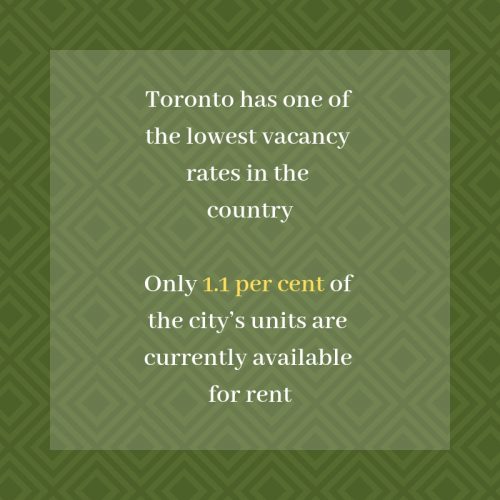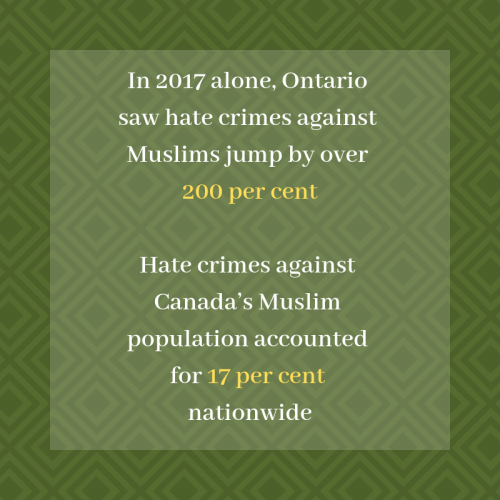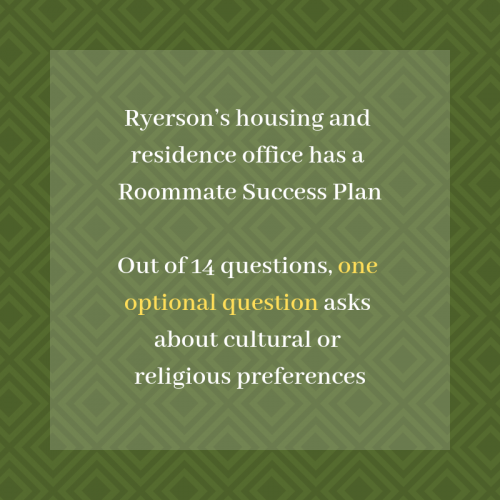VISIBLY MUSLIM WOMEN HAVE TO DEAL WITH MORE THAN EXPENSIVE HOUSING IN TORONTO. VICTORIA SHARIATI REPORTS ON THE ISLAMOPHOBIC PLAYING FIELD
Nasrin Seif* got ready one cold morning in early January, ready to check out one of the few affordable apartments she could find in Toronto. As she was about to leave, her phone buzzed with a WhatsApp message from her potential landlord. The landlord had one last question for her. “She told me she thought my name sounded Arab,” Seif says. “Then she asked me, ‘Are you a Muslim?’”
Seif, who is a Muslim woman and wears a hijab, replied ‘yes.’ The landlord incorrectly assumed that Seif would take issue with the other renters eating non-Halal food, which she tried to explain wouldn’t be a problem. But the landlord said she, “Didn’t need any Muslims in the house,” and told her not to come to the viewing at all. Seif said she didn’t have a problem with the food, and assumed that wasn’t the landlord’s real issue. “Thanks for your honesty about my religion,” Seif told her. The landlord didn’t answer and blocked Seif’s number right after.
The 25-year-old McMaster graduate student had just moved to Toronto from Denmark and was facing a “desperate time” in her life.
Seif now lives in a one-bedroom in Midtown, but the experience remains etched into her memory. She says it was the most racist thing she had ever encountered. “I was like, ‘OK, let me just say screw it and find another place.’”
Wearing a hijab can make a Muslim woman feel hypervisible, like she is a walking target for harassment. In her study, The crusade over the bodies of women, Sonya Fernandez identifies the hijab as being perceived as a symbol of gender inequality and “all that is oppressive about Islam.” The veil is seen less as a religious identity and more as a representation of anti-Western aggressiveness, Fernandez writes. This allows people with racist attitudes to pretend they’re trying to save Muslim women from gender inequality.
In other words, hijabi women are often forced into a box constructed by other people’s preconceived, inaccurate notions of how they live their lives. Whether it’s confronting these ideas, finding the right roommate or even just trying to find a safe place to live—visibly Muslim women are left to navigate an expensive housing market and racist landlords without much support.
The Ontario Human Rights code protects individuals against discrimination in accommodations based on things like ancestry, religion or ethnic origin. This means that legally, nobody can be denied an apartment, job or service based on their identity. Yet Muslim women still face this kind of discrimination.

According to Annie Hodgins, manager of the housing access stabilization and eviction prevention program at the Centre for Equality Rights in Accommodation (CERA), racial or religious housing discrimination happens a lot more than people think. She said the centre received 1,300 calls last year alone from tenants who were facing either eviction or discrimination in their living situations. A lot of reports, Hodgins said, included experiences of discrimination against people who have a disability or those with precarious immigration statuses.
What makes housing discrimination unique compared to other forms of discrimination, however, is that the victim of it often doesn’t know what they’re experiencing is illegal. “Sometimes people might be discriminated against in their housing, but they just don’t understand that there’s actually something they can do about it,” Hodgins says. “Discrimination based on a human rights ground is different than the general tenant versus landlord dispute.”
Hodgins adds that even if someone is trying to enforce legal rights to protect themselves from such discrimination, the lack of case law around this issue sets a vague precedent.
When students are searching for housing, Hodgins says, they’re just trying to find a roof over their head. “Once [a discriminatory incident] happens, people just move on to the next [rental application],” she says, “Which I understand completely, because it’s such a competitive market.” On top of the fact that Toronto has one of the lowest vacancy rates in the country—only 1.1 per cent of the city’s units are currently available for rent—oftentimes students won’t bother reporting an incident because their first priority is finding a place to live.
Seif says that had her landlord seen a photo of her before their first time communicating, she didn’t think she would have even responded to her first message.

“What is the landlord going to be like?” said Zainab Damji as she ran down the list of concerns she had before moving to Toronto from Dubai for Ryerson’s journalism program. “Where is the apartment? Are there any men living there?” These thoughts bounced around her head every time she came across a listing, feeding into the anxiety she already had about moving halfway across the world.
The first-year student, who also wears a hijab, says her biggest concern when it came to living in the city was the possibility of being the victim of a hate crime. Just over two years ago, six Muslim men were murdered while praying in the Islamic Cultural Centre of Quebec City. Statistics Canada reports that in 2017 alone, Ontario saw hate crimes against Muslims jump by over 200 per cent, while hate crimes against Canada’s Muslim population accounted for 17 per cent of nationwide. The fear around adding to those numbers made her skeptical of almost every apartment she came across; if she wasn’t worried about an Islamophobic landlord or housemate, she’d stress about the likelihood of hate crimes occurring in a potential neighbourhood. “It’s one thing, because a lot of women are afraid to go out at night or walk home alone. And then on top of that, to be visibly part of a minority, I feel like it put a lot of constraints on where I should live.”
Before coming to Canada, Damji voraciously read news stories about the latest Islamophobic attacks on hijabi women and started to freak herself out. Ultimately, she found safety in the bustling city streets—having more people around her made her feel more secure. Damji now lives in a Ryerson residence in the heart of downtown Toronto. Had she gone to a different university with dormitories in a less populated area, she would have had to think twice before running errands late at night or walking home alone.
According to Jasmin Zine’s 2009 study, Living on the Ragged Edges, Muslims in Toronto represent a community “in exile.” Immigrants and refugees already have to deal with issues that arise out of resettlement: an unfamiliar home, lack of “cultural capital” when it comes to navigating Canadian institutions, language barriers and lack of accreditation for professional jobs. These barriers, Zine wrote, are heightened when discrimination on the basis of race or religion is involved.
Cultural capital, in Damji’s case, refers to the knowledge of, or familiarity with, housing networks or community resources. Recently, she came across Muslim Womxn at Ryerson, an intersectional Muslim feminist group that slipped under her radar during her frantic search for housing. She said that had she known at the time that there were support networks available specifically for Muslim women, she would have reached out to ask for guidance.
Ryerson’s housing and residence office has a Roommate Success Plan—a survey that one representative from each room is required to complete. The survey goes into establishing students’ sleeping and social habits, with an ultimate goal of reviewing students’ experiences with their roommates. Out of 14 questions, one optional question asks about cultural or religious preferences. But Damji says Ryerson should organize a platform specifically geared towards helping people of colour find housing.
Whether it’s paranoia about her safety or being caught off-guard by male visitors, Damji has to live in her own city and home with both eyes open.

Saira Ahmed* stood in the bedroom of her Toronto apartment, listening through the closed door. She wasn’t sure if her roommate’s boyfriend was spending the night again—as he often did—and if he was, she would need to cover herself before going to the washroom.
At the time, Ahmed, now 23, was in her final year of studies at Western University. She had to move to Toronto for an internship and found herself living with some roommates whose lifestyles clashed with hers, such as boyfriend schedules or the frequency of partying and drinking excessively at home. In Toronto, roommates are often necessary to afford soaring rental prices. While Ahmed graduated last year, she said she’s still surprised at how difficult it was to find roommates who could accommodate her needs as a hijabi woman. “Right off the bat,” she says about her former roommates, “I knew it wouldn’t work out.”
While she didn’t mind if her roommates had boyfriends over on occasion, Ahmed said she was uncomfortable when men would spend entire weekends crashed on their couch.
A common practice for Muslim women is to be dressed modestly. For some women, that includes wearing a scarf on their head and refraining from showing too much skin when men they aren’t familiar with are around. So Ahmed decided to casually bring up the issue to her roommates. But they were shocked that this was something they had to be considerate with. Ahmed quickly dropped it—she felt they would think it was too much to ask.
Ahmed realizes how her lifestyle can clash with other people’s habits and knows that ultimately, accommodation is a two-way street. But she still managed to find a non-Muslim roommate who was willing to put in the effort—she says the two have an easy and respectful relationship.
Ahmed says keeping an open, honest line of communication throughout the relationships with roommates is key to having a comfortable living situation where no one has to compromise their values. As soon as she finds a potential roommate, Ahmed informs them that she wears the headscarf and having male guests over too often would be an inconvenience for her. “You don’t have to be forced to accept anything,” she says. “Most people are pretty respectful.”
Because Islamophobia is still prominent, Damji knows her religion—and the way she chooses to practice it—can be a source of contention for future landlords. Her concerns highlight the volatility of the status of Muslim women in Canada, as well as the unique way that Muslim students are forced to experience young adulthood.
If someone faces discrimination or harassment in housing because of their religion, Hodgins says organizations like CERA can step in. They can contact the landlord and encourage them to correct their discriminatory actions, reminding them of their legal obligation to respect a person’s right to religious accommodation.
In some cases, the issue can be brought to the Human Rights Tribunal of Ontario, as was seen when a Brampton couple was awarded $12,000 because their landlord failed to accommodate their religious practices.
Hodgins says one of CERA’s goals is to bring more attention to this: People have every right to ask for religious accommodations and should know they have a right to have those needs respected.
Earlier this year, Damji was looking to rent an apartment with a friend for the fall. When asked if she had learned any approaches that would make things easier this time around, she answered without hesitation: “No.”
While looking for a place with a friend has definitely helped alleviate some of the stress, Damji says that when she eventually plans on living alone, she’ll just have the same experiences all over again.
Every Muslim woman has to think about this, Damji says. With residence, she points out, you’re protected from those potential experiences for one year. “After that, you’re on your own.”
*Names changed to protect anonymity












huda alsarraj
I work with the National Council of Canada, an organization the advocates for Muslims in Canada. I am very interested in speaking to the ladies you have interview to provide resources and get some more information so that we have stats for discussing these issues.
I will also like to share this publications on our social media and ensure that we are able to help in any way. No one should have to go through this alone and I thank you for reporting on such an important cause.
Features Editor
Hi Huda, thanks so much for your comment! We’d be happy to discuss. Please email me at features@theeyeopener.com and we can figure something out.
Sufian
You should look for a website called islamic rentals. Perhaps this might help out their situation.
Marram Haq
As a country who claims to value diversity, it is kind of disappointing to read the statistics on hate crimes against Muslim women. That being said, the misconceptions of Islam leading to hatred of Muslims is at a large and it is important to do research from proper sources and have an open mind. Hatred has never resulted in a positive outcome. We are all one! we are equal! And we should embrace our differences and focus on loving one another. The world has a lot of hate. It’s time to fill it with love.